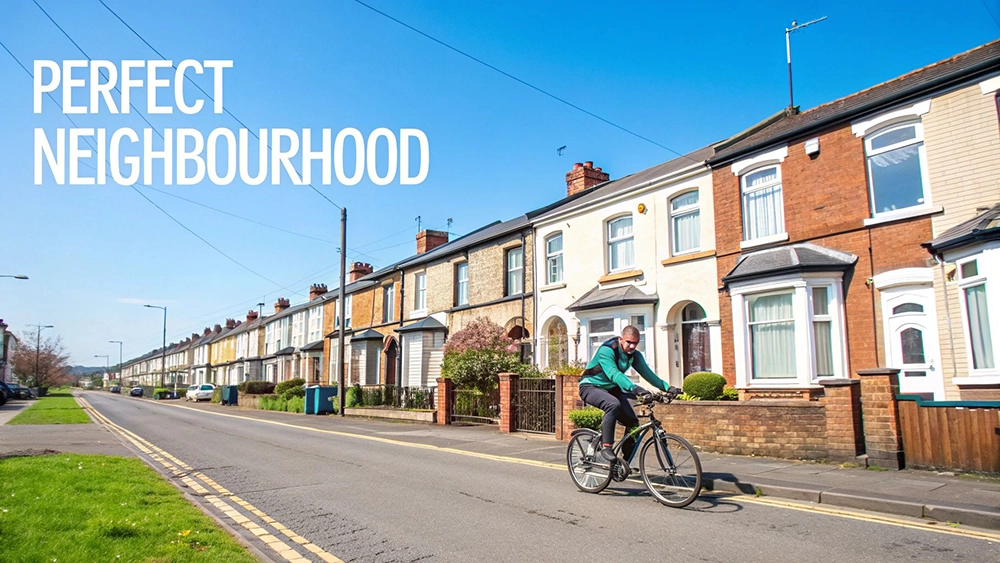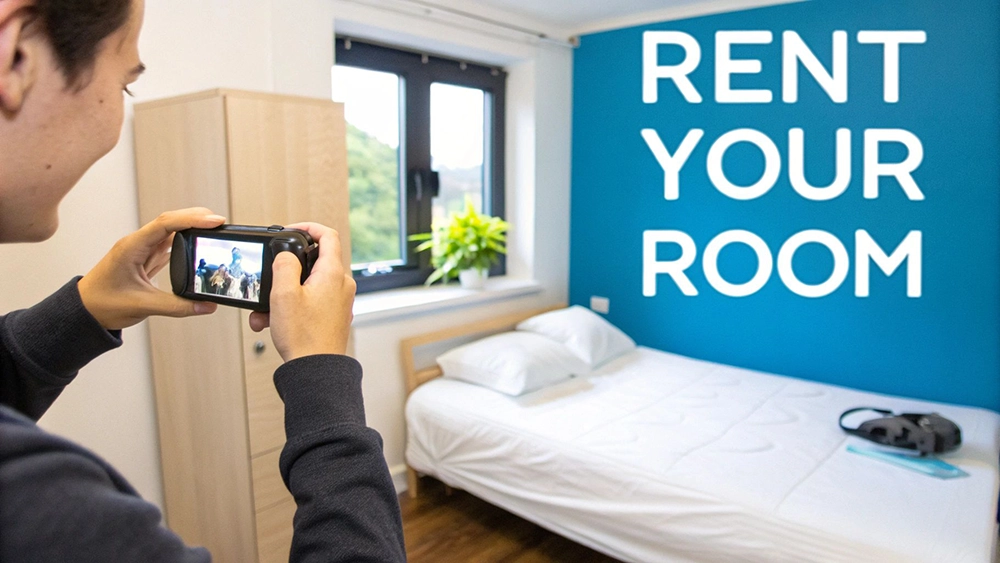Finding a house share in Cardiff is a brilliant way to enjoy the city without breaking the bank. Whether you're a student, a young professional just starting out, or simply looking to keep your living costs down, it's a popular choice for a reason.
Cardiff's rental market is buzzing and pretty competitive, thanks to its large student population and a steady stream of people moving to the Welsh capital for work. To get ahead, you need to understand the true costs beyond just the rent and get a feel for the city's fast-paced rental scene.
Navigating the Cardiff House Share Scene

Jumping into the Cardiff rental market can feel a bit full-on at first, but knowing the landscape is half the battle. House sharing is incredibly popular here, a direct result of the city’s thriving student community and the number of professionals looking for sociable and affordable places to live.
Understanding the Real Costs
To get your budget right, you absolutely have to look beyond the advertised room price. The real cost of a house share always includes a few other essential expenses. You’ll need to factor in your share of the council tax (unless you're in a student-exempt property), gas, electricity, water, and broadband. These can add a fair bit to your monthly outgoings.
On top of that, nearly every landlord will ask for a security deposit, which is usually the same as one month's rent. This is a significant upfront cost you need to be ready for.
Here's a realistic breakdown of typical monthly costs for one person in a Cardiff house share to help you plan your finances.
Your Estimated Monthly Budget for a Cardiff House Share
| Expense Category | Estimated Cost Range (Per Person) |
|---|---|
| Rent (for one double room) | £550 - £800 |
| Council Tax (Band C/D split 3 ways) | £50 - £75 |
| Gas & Electricity | £60 - £100 |
| Water | £15 - £25 |
| Broadband | £10 - £15 |
| Total Estimated Monthly Cost | £685 - £1,015 |
These figures are just a guide, of course, but they paint a much clearer picture than the rent alone. Some landlords offer 'bills included' packages, which can make budgeting much simpler.
Takeaway: Your total monthly housing cost isn't just the rent. Always ask for an estimate of combined monthly bills to get a realistic financial picture before committing.
Cardiff's Competitive Rental Market
Good rooms in popular areas get snapped up fast. The high demand often means there are more people looking than there are rooms available. Recent stats show that the average rent in Cardiff shot up to £1,119 per month for a whole property, which is a 9.9% increase in just one year. This competition means you need to be on the ball and organised with your search.
Having a clear idea of what you want—your budget, preferred areas, and deal-breakers—will help you cut through the noise. Start your search for rooms to rent in Cardiff on sites like https://www.roomsforlet.co.uk/search/ as early as you can to give yourself the best shot at finding the perfect place.
Once you’ve got your new house share sorted, the final piece of the puzzle is the move itself. To make sure everything goes smoothly, it's worth checking out some practical advice on how to prepare for moving your home.
Finding Your Perfect Cardiff Neighbourhood

Choosing where to live in Cardiff isn't just about finding a room; it’s about finding a corner of the city that clicks with your lifestyle. Your postcode will shape everything from your daily commute and social life to your monthly budget. The city is a fantastic patchwork of different areas, each with its own vibe and community spirit.
For most students, the decision is pretty straightforward. Cathays and Roath are the undisputed heart of student life, sitting right on the university's doorstep. They’re buzzing with energy, cheap takeaways, and student-friendly pubs, offering that classic university experience where you're never far from your mates or a 9 AM lecture.
For Professionals and Postgraduates
If you’re a young professional or a postgrad student after something a bit more chilled, several neighbourhoods strike the perfect balance. Pontcanna and Canton are incredibly popular for their trendy, independent feel.
- Pontcanna is famous for its gorgeous Victorian houses, artisan bakeries, and its proximity to Bute Park. It's ideal for anyone who loves green spaces and a sophisticated café culture.
- Canton, just next door, has a slightly more vibrant and diverse atmosphere. It's packed with fantastic restaurants along Cowbridge Road East and is home to the Chapter Arts Centre, a hub for film and culture lovers.
These spots offer a more settled vibe while still being brilliantly connected to the city centre. They're perfect if you're looking for a quality house share Cardiff experience that blends city living with a real sense of community.
Budget-Friendly and Up-And-Coming Areas
Finding an affordable room doesn't mean you have to settle for less. Areas like Grangetown and Splott are getting more popular by the day, thanks to their great value and unique identities. They boast excellent transport links and a more authentic, local feel away from the student hustle.
A good way to gauge rental affordability is to look at local property values. In Cardiff, a huge chunk of properties sold recently were in the £100,000 to £200,000 bracket, with 19.2% selling for between £150,000 and £200,000. This points to a healthy market for more affordable housing, which usually means more budget-friendly house share options in these emerging neighbourhoods. You can dive deeper into local housing prices with this detailed ONS data visualisation.
Key Takeaway: Don't just rely on a map. Get out and visit potential neighbourhoods at different times of the day. It’s the only way to get a true feel for the atmosphere, noise levels, and local amenities before you make any decisions.
How to Stand Out in Your House Share Search

In a buzzing rental market like Cardiff's, your first impression is everything. It’s no exaggeration to say the best rooms get dozens of enquiries, so firing off a generic "Is this available?" message is a surefire way to get ignored. The real key is to be prepared, professional, and personal right from the start.
That initial message is your moment to shine. Think of it less like a quick text and more like a mini-CV for a potential housemate. Instead of a one-liner, take a minute to properly introduce yourself. Mention what you do for work or study, touch on a couple of your hobbies, and explain why you think you’d be a great fit for that specific house. This simple effort shows you’ve actually read their advert and are genuinely interested.
Want to get ahead of the competition? A great tactic is to register as a tenant on Rooms For Let and set up alerts. That way, you’re pinged the moment a room matching your criteria gets listed, giving you the chance to be one of the very first people to respond.
Nailing the Viewing
So, you’ve secured a viewing – brilliant! Now it’s time to show you’re organised. Turn up on time and come armed with a few practical questions. Not only does this get you the information you need, but it also signals to the landlord or current tenants that you're serious and responsible.
It’s always a good idea to ask about these key areas:
- Bills Breakdown: Ask for a realistic monthly average for everything – council tax, gas, electricity, water, and broadband. Surprises are rarely good when it comes to bills.
- House Dynamics: Try to get a feel for the general atmosphere. Is it a social house where everyone cooks together, or do people tend to keep to themselves?
- Cleaning Rota: It might seem minor, but figuring out how cleaning is managed can save a lot of future headaches. Is there a formal rota, or is it more of a casual understanding?
Showing genuine interest goes a really long way. Don't just focus on the room itself. Ask about the other housemates, what they enjoy about living there, and what they love about the neighbourhood. This helps build a real connection and shows you’re looking for a home, not just a room.
Being the Ideal Applicant
At the end of the day, landlords and existing tenants are all looking for the same thing: someone reliable, respectful, and easy to live with. You can prove you’re that person by having all your documents ready to go.
Get digital copies of your references (from a previous landlord or your employer), proof of income or your student status, and your Right to Rent information. Having everything prepared shows you're organised and proactive—exactly the kind of person anyone would be happy to share their home with.
Renting Your Spare Room in Cardiff The Smart Way

If you're a homeowner with a spare room, finding the right lodger is everything. It's the difference between a great, hassle-free experience that helps with the bills and a stressful situation you can’t wait to end. The journey starts with creating an advert that not only catches the eye but also speaks directly to the kind of person you’d be happy to share your home with.
First things first: photos are non-negotiable. Tidy the room, throw open the curtains to let in that natural light, and take plenty of clear, bright pictures. Don’t just focus on the bedroom; show off the shared spaces like the kitchen, living room, and bathroom, too.
Crafting a Listing That Gets Results
Your advert's description is your pitch. It’s your chance to go beyond just listing features and actually describe the lifestyle that comes with the room. A bit of know-how goes a long way here, so it’s worth taking the time to learn copywriting principles to really make your listing stand out.
Get into the details that truly matter to someone looking for a new home:
- Transport Links: "You're only a 10-minute walk from Cathays station, so getting around is a breeze."
- Local Vibe: "We're really close to all the independent cafes and shops on Whitchurch Road."
- House Atmosphere: "This is a quiet, professional house – perfect if you work from home or just value a peaceful space."
This kind of detail helps people actually picture themselves living there. Once your advert is polished and ready, you can explore various listing packages to make sure it gets in front of the right audience. You can find our advert pricing details here: https://www.roomsforlet.co.uk/advert-prices/
Your Responsibilities and Vetting Potential Lodgers
As a landlord, even if you’re just renting one room, you have some important legal duties. A big one in Cardiff is the House in Multiple Occupation (HMO) licence. If you plan to rent to three or more people who aren't from the same family, you’ll likely need one.
You'll also need to make sure your property has a valid Gas Safety Certificate, an Energy Performance Certificate (EPC), and working smoke alarms. Crucially, you must perform a Right to Rent check on any potential lodger to confirm they have the legal right to rent in the UK.
But it’s not all paperwork. Choosing the right person is also about personality and fit. Always arrange an informal chat or a viewing to get a feel for them. A great lodger is someone who respects the property and gets along with everyone else, making it a positive home for all.
Getting the Paperwork Sorted: Your Tenancy Agreement and Deposit
So, you've found the perfect room. Brilliant. Now comes the part that can feel a bit daunting: the paperwork. It’s tempting to just skim through and sign on the dotted line, but this contract is your single most important protection in a house share Cardiff property. Take a breath and actually read it.
Landlord or Lodger? Knowing Your Agreement
Most of the time, you'll be handed an Assured Shorthold Tenancy (AST). This is the standard, formal agreement for when you're renting from a landlord who doesn't live at the property with you. An AST gives you solid legal protections, especially around things like deposits and evictions.
The other common setup is a lodger agreement. This is what you'll get if you're renting a room in the homeowner's own property. These are less formal and offer fewer protections because you're technically sharing the landlord's home. It's a crucial difference to be aware of.
The Devil's in the Detail: Key Clauses and Your Deposit
No matter which agreement you're signing, there are a few bits you absolutely must check. Look closely for the notice period you need to give if you want to move out. Also, check for any rules about rent increases and who's responsible for what when it comes to maintenance and repairs.
Your deposit is still your cash, and the law is on your side to protect it. For an AST, your landlord must place your deposit into a government-backed tenancy deposit scheme (TDP) within 30 days of you paying it. Don't be shy about asking for proof.
This is a non-negotiable legal requirement. It ensures your money is held by a neutral third party, so any disagreements about deductions when you leave are handled fairly. An inventory, complete with dated photos of the property's condition when you moved in, is just as vital. It's your evidence against any unfair claims later on.
And remember, there is support out there if you need it. The Local Housing Allowance (LHA) rates for shared rooms in Cardiff, for example, were set at £84.25 per week, which is a massive help for many people. You can find out more by checking the indicative Local Housing Allowance rates for 2024 to 2025 on GOV.UK.
Got Questions About Cardiff House Shares? We’ve Got Answers.
When you’re diving into the world of Cardiff house shares, a few practical questions always pop up. Getting your head around these common queries will make the whole process feel less daunting, whether you’re a student heading to Cathays or a young professional eyeing up Pontcanna.
How Much Should I Expect to Pay for a Room?
Let's talk numbers, because that’s what everyone wants to know first. In the student-heavy postcodes around Cathays, you’ll find rooms advertised anywhere from £450-£600 a month. If you’re looking for the slightly more grown-up vibe of Pontcanna or Roath Park, the prices creep up, typically landing somewhere between £550 and £700+.
Don’t forget to budget for bills! As a rule of thumb, set aside an extra £90-£130 per person each month to cover the essentials.
What’s the Deal with Rent Liability?
This is a big one, and it catches a lot of people out. You need to know what kind of contract you’re signing. If the tenancy agreement includes a ‘joint and several liability’ clause, it means everyone in the house is collectively on the hook for the entire property's rent.
So, if one housemate decides to do a runner, the landlord can legally chase the rest of you for the missing share. It’s not ideal. The alternative, an individual room contract, is much safer as you’re only ever responsible for your own rent.
How Does Council Tax Work in a Share House?
Council tax is another classic point of confusion, especially when you have a mix of students and professionals under one roof. Here’s the breakdown:
- Student-Only Houses: Simple. If every single person living in the property is a full-time student, the house is completely exempt. No council tax to pay.
- Mixed Households: The moment a non-student joins the house, the exemption disappears. The professional can usually claim a 25% single-person discount, but the remaining 75% of the bill still needs to be paid. It's vital to have an honest chat about how this will be split before anyone signs on the dotted line.
Always, always ask for a copy of the tenancy agreement to read before you commit. Understanding your rent and council tax obligations from the get-go will save you from some serious financial headaches down the line.
Finally, knowing where to cast your net is half the battle. For properties managed by agencies, Rightmove and Zoopla are the usual suspects. But if you want to find a room directly with the people you’ll be living with, local Facebook groups like ‘Cardiff House Share’ or ‘Cardiff Spare Rooms’ are absolute goldmines.
Ready to find your perfect spot? With thousands of listings across the city, Rooms For Let makes it easy to connect with landlords and find your ideal house share in Cardiff. Start your rooms to rent search today!